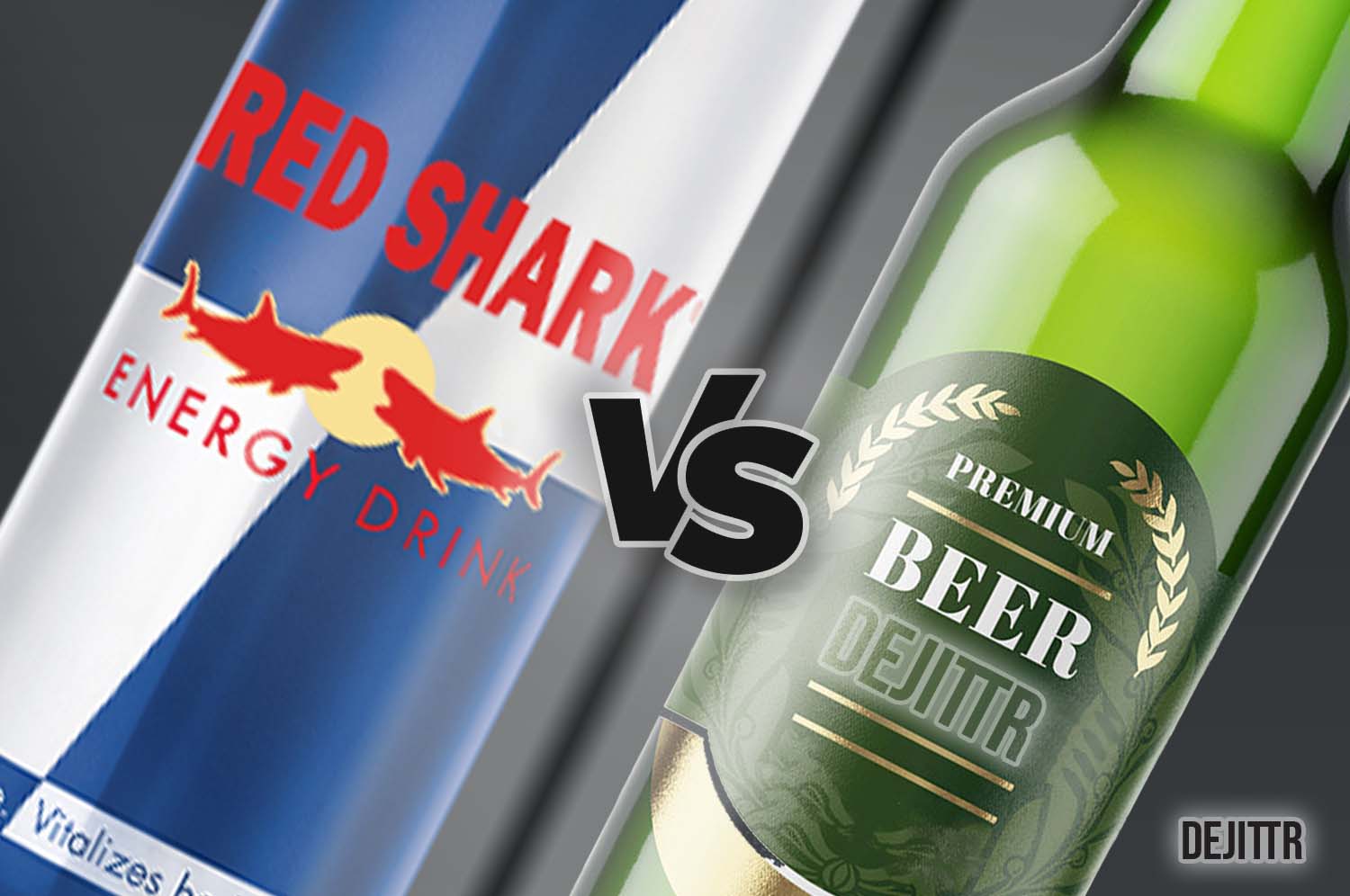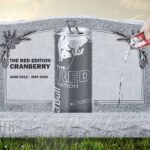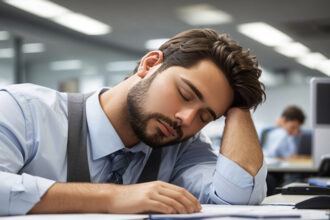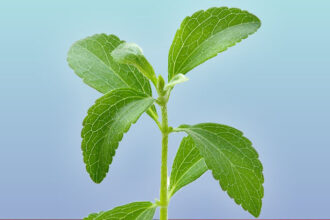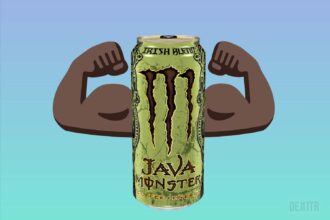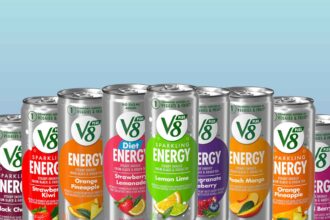Are you puzzled to decide which is less harmful: Energy Drinks or Beer? Then look no further because, in this guide, I will share with you a detailed overview of both beverages. I know this is not a direct apples-to-apples comparison, but we thought it would be helpful to do a versus of the 2.
After reading this guide till the end, you will get a clear picture of both beer and energy drinks, their ingredients, and their possible health effects. So without further ado, let’s get started!
Are Energy Drinks Better For You Than Alcohol?
Energy drinks and alcohol both have some benefits and drawbacks. However, as a general rule, when overconsumed they both can be harmful.
| Comparison Points | Energy Drinks | Alcohol |
| Advantages | Reduction in mental fatigue, Improvement in measures of brain functions like memory, concentration, and reaction time. | Moderate consumption may decrease your threat of developing and dying of heart disease, decrease the risk of ischemic stroke, and decrease the risk of diabetes. |
| Disadvantages | Unable to sleep (Insomnia), Feeling nervous and jittery, dehydration, and heart complications. | Excessive consumption can lead to heart disease, stroke, liver disease, high blood pressure, and digestive issues. |
Energy drinks are beverages marketed as a product whose consumption can boost your energy. In contrast, Beer is a popular alcoholic drink made from yeast-fermented malt and is flavored with hops.
Let’s look at the beer and energy drinks ingredients and their effects on our health.
Beer Vs. Energy Drink Ingredients
Beer Ingredients And Effects
The basic ingredients of Beer include Water, Malted Barley which plays the role of a starch source and can be fermented and converted into alcohol. Also, Brewer’s Yeast is used for the fermentation process, and flavoring like Hops is added to the Beer.
The most common and well-known threat from Beer is the alcohol present in it. Depending on the style of Beer and its recipe, the alcohol content in Beer can be lower than 3% to about 40%. (Regular Beer contains about 5% alcohol while some light beers have 4.2%).
As per WebMD, if you drink in moderation, Beer can have health benefits. In order to decrease the alcohol-related harm, here are the general dietary guidelines for alcohol consumption:
- If you are an adult of legal drinking age, then you can avoid drinking
- Or you can consider moderate intake by limiting two drinks or less in a day for men.
- One drink or less in a day for women.
Beer is known to prevent heart disease by raising the level of high-density lipoprotein (HDL), also known as Good Cholesterol. Furthermore, Beer contains Vitamin B6, which can help decrease the homocysteine level, a risk factor chemical for heart diseases.
However, before you think you need a beer 😉 Here I’m sharing with you some of the harmful effects of Beer.
If you drink beer or any type of alcohol in excessive amounts, it will be harmful to you.
| Immediate Side Effects of Excessive Beer Drinking | Long Term Health Threats of Excessive Beer Drinking |
| Drowsiness | Heart Disease |
| Confusion | Liver Disease |
| Vomiting | Digestive Issues |
| Low Blood Sugar | Cancers |
| Irregular Heartbeat | Depression |
| Alcohol Poisoning | Anxiety |
If you already drink Beer, then moderation is the key. However, if you didn’t start drinking Beer, then no need to get carried away by the health benefits that we saw earlier. Remember, the risk of drinking Beer outweighs any health benefit you would get from drinking it.
Therefore, you should rather start engaging yourself in enough physical work activity and maintaining a healthy diet to live a healthier life.
Energy Drink Ingredients And Effects
Whereas the ingredients of energy drinks include Carbonated Water, Sugar, Artificial Sweetener, and Caffeine. Moreover, it also has Herbs/Substances that are related to mental awareness but don’t have scientific evidence with controlled trials (Panax ginseng root extract, guarana seed extract, taurine, L-carnitine, L-tartarate, B vitamins).
Here are some of the health effects associated with consuming the energy drinks:
- Those who drink energy drinks struggle to sleep properly compared to those who don’t.
- Energy drinks can increase nervousness (so if you are already a nervous person, you should surely avoid them for better health)
- There are also concerns regarding energy drinks contributing to potential heart problems.
- It has been found in different studies that energy drink consumption can cause higher blood pressure and heart rate.
Usually, as per the experts, it is believed that the main culprit behind the heart problem related to energy drink usage is excessive caffeine consumption.
Generally speaking, the recommended adult caffeine consumption is no more than 400 mg per day. And energy drinks typically have about 80 mg of caffeine per 8 ounces (237 ml).
However, based on what size and type of energy drink you are consuming, it is quite easy to exceed the recommended caffeine consumption mark if you drink multiple energy drinks in a day.
Although if you drink energy drinks occasionally, it is unlikely to cause harm. But it is best to avoid including it in your everyday schedule.
Do Energy Drinks Contain Any Alcohol?
If the energy drink is non-alcoholic (for example, Red Bull), it does not contain alcohol. However, there are alcoholic energy drinks available (for example, Sparks – 6% alcoholic content by volume) with alcohol content.
| Non-Alcoholic Energy Drinks | Alcoholic Energy Drinks |
| Red Bull | Sparks |
| Monster | Four Loko |
Alcohol acts as a depressant in nature. In comparison, energy drinks are known for their stimulant effect. Now, what can you expect from a product that contains both?
The alcoholic energy drinks offer the alcoholic effects without the loss of energetic effect you would get from a normal energy drink.
Here’s the alcoholic content of some of the alcoholic energy drinks:
| Alcoholic Energy Drinks | Alcohol Content |
| Torque | 6% |
| Joose | 6% – 12% |
| Four Loko | 8% – 14% |
And if we see the alcohol content in regular Beer, it turns out to be about 5%.
The alcoholic energy drinks are an inexpensive option compared to the drink you would prepare after mixing the hard liquor and the energy drink. Also, you don’t have to purchase any extra bottle of liquor.
After reading all these, you might think that it is beneficial to combine both of these drinks. But in reality, that is not the case.
Mixing Energy Drinks With Beer
Alcohol acts as a sedative. On the contrary, energy drinks are meant to stimulate the drinker. So for one second, you might think combining both of these will keep the drinker alert. But the fact is, this turns out to be a big negative point for this combination.
Energy drinks are usually marketed as the one that boosts physical and mental performance. The most common stimulant component in these drinks is caffeine.
As per the Centers for Disease Control and Prevention, when you mix both alcohol and caffeine, the caffeine actually masks the depressant effect of alcohol. This, in turn, causes the drinker to remain more alert than they normally would.
Therefore, the drinker gets tempted to drink more to become impaired than they would realize and, in effect, cause a higher probability of alcohol-attributable harm.
In a study done among the Michigan high school students, it was found that the drinkers who binge drank were more than double times likely to mix both alcohol and energy drinks compared to the non-binge drinkers.
Do Energy Drinks Have The Same Effect As Alcohol?
When drunk solely, especially non-alcoholic energy drinks like the Red Bull, you shouldn’t have any alcoholic effects because they don’t have alcoholic content. However, if you drink alcoholic energy drinks, you can expect the alcoholic effect and the potential harm of mixing both.
When you drink alcohol and energy drinks mixed together, you don’t realize how much you are supposed to drink as you would normally while drinking plain alcohol.
Did you know? In a study of four hundred and three young Australian Adults, it was found that the people were about six times more likely to have heart palpitations when they drank a mix of both alcohol and energy drinks compared to the ones who drank only alcohol.
In the mid-2000s, there arose the popularity of pre-mixed alcoholic drinks. However, nearly in 2010, as per the directions of the US Food and Drug Administration, companies were forced to get rid of the stimulants from the alcoholic beverages (mainly due to the potential medical issues)
However, still many people and bars mix both alcohol and energy drinks. Due to associated health risks, you shouldn’t consume energy drinks mixed with alcohol.
Final Thoughts
Energy drinks can lead to high blood pressure, obesity, and cardiovascular issues. Whereas excessive consumption of Beer can lead to a higher risk of heart disease, liver disease, and alcohol dependency. Both beverages have some associated benefits; however, their harmful effects outweigh those benefits.
Moderation is the key if you are already an excessive drinker. But since both of them pose a threat to our health in some way or the other, it is always a better option to be away from these beverages. And instead, we should focus on maintaining a healthy lifestyle.
Quick FAQs:
Generally speaking, Beer is vegan because all its ingredients, like water, yeast, barley, and hops, are vegan. However, some brewers also use animal-based products like gelatin or isinglass, due to which it is crucial to check the ingredients properly.
Technically, Beer is also a carbonated beverage because carbonation occurs naturally in the Beer. However, it is categorized differently in most cases because carbonated beverages normally refer to non-alcoholic items while Beer contains alcohol.
Beer is quite acidic, and it is also carbonated, so it is not good considering the heartburn issue. However, it has relatively lesser alcohol content than other alcoholic beverages.
Other recent articles:


